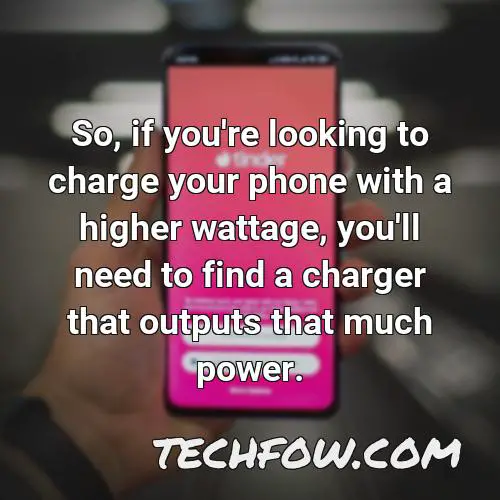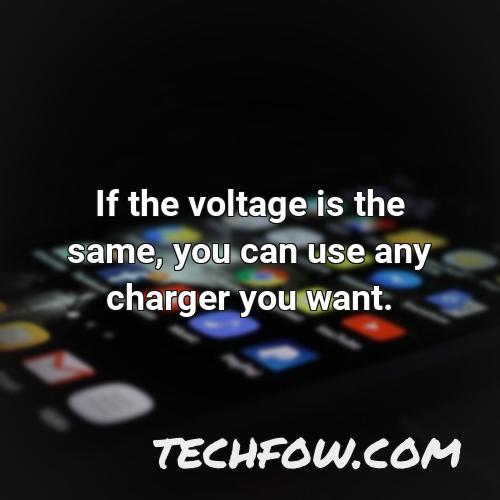Here Is A Quick Way To Solve A Tips About Is It Safe To Charge With Higher Wattage
![Can I Use 45w Charger For Iphone [New Data] Can I Use 45w Charger For Iphone [New Data]](https://www.techfow.com/wp-content/uploads/2022/09/furthermore-this-data-suggests-that-it-may-be-better-to-buy-a-higher-wattage-power-adapter-if-you-want-your-phone-to-be-charged-faster.jpg)
Can I Use 45w Charger For Iphone [New Data]
The Watt's Up (and Down) of Charging
1. Understanding Wattage and Your Devices
Ever looked at your phone charger and wondered what all those numbers mean? Don't worry, you're not alone! The key number we're focusing on here is wattage. Think of wattage as the speed at which electricity flows into your device's battery. A higher wattage charger can fill 'er up faster, but the big question is: Is it safe to charge with higher wattage? Let's unravel this mystery.
Essentially, wattage is calculated by multiplying voltage (the electrical pressure) by amperage (the electrical current). Your device and charger have specific voltage and amperage ratings. The charger needs to be compatible with your device to ensure safe and efficient charging. Ignoring this, and well, you might end up with more than just a slow charging phone.
The main point here is compatibility. Your phone or tablet is designed to accept a certain amount of power. If you plug it into a charger that delivers significantly more power than it's designed to handle, you could potentially damage the battery or even the device itself. Imagine trying to force a gallon of water through a straw — it's just not going to work, and something might break!
But fear not! Modern devices are generally pretty smart. They have built-in power management systems that regulate the amount of power they draw from a charger. So, using a slightly higher wattage charger doesn't automatically mean your phone will explode. However, understanding the limits is still essential. Lets explore that.
![Can You Charge Your Phone With Laptop Charger [Expert Review] Can You Charge Your Phone With Laptop Charger [Expert Review]](https://www.techfow.com/wp-content/uploads/2022/09/if-your-phone-supports-usb-pd-then-the-charger-will-be-using-that-to-provide-a-higher-wattage.jpg)
Can You Charge Your Phone With Laptop Charger [Expert Review]
The Safety Dance
2. Decoding the Device's Needs
The good news is, many newer smartphones and tablets are designed to handle higher wattage charging, often referred to as "fast charging" or "power delivery" (PD). These devices have sophisticated circuits that negotiate with the charger to determine the optimal charging rate. They'll only draw as much power as they can safely handle, even if the charger is capable of delivering more. This is usually indicated by standards like USB Power Delivery (USB-PD) or Quick Charge (QC).
However, older devices or devices without fast charging capabilities might not be so forgiving. Using a significantly higher wattage charger with these devices could lead to overheating, battery degradation, or, in rare cases, even damage. That ancient flip phone you found in the attic? Probably best to stick with its original charger!
So, how do you know if it's safe? Check the device's documentation or manufacturer's website. Look for the recommended charging wattage or the supported fast charging standards. If it says "5V/2A," that means it's designed for a 10-watt charger (5 volts x 2 amps = 10 watts). Using a slightly higher wattage charger, like a 12-watt charger, is usually fine, but avoid going overboard.
Another thing to consider is the quality of the charger itself. A cheap, poorly made charger, even if it has the correct wattage rating, can still be dangerous. Look for chargers from reputable brands that have been tested and certified for safety. Don't skimp on quality when it comes to electricity!

Can I Charge My Phone With 30 Watt Charger (Guide)
Charger Quality Matters
3. Quality Over Quantity
Think of chargers like chefs. You can have two chefs making the same dish (charging your phone), but one might use high-quality ingredients and meticulous techniques, while the other cuts corners. The result? One delicious meal (happy phone) and onewell, let's just say you might be reaching for the antacids (damaged battery).
Cheap, unbranded chargers often lack essential safety features like over-voltage protection, over-current protection, and short-circuit protection. These features protect your device from electrical surges and other potential hazards. A reputable charger will have these protections built-in.
Certifications are also a good indicator of quality. Look for chargers that are certified by organizations like UL (Underwriters Laboratories) or CE (Conformité Européenne). These certifications mean that the charger has been tested and meets certain safety standards.
Pay attention to the materials used in the charger's construction. A well-built charger will use high-quality components that can withstand heat and stress. A flimsy charger with thin wires and cheap plastic is a red flag. Ultimately, a slight investment in a well-made charger can save you money (and potential headaches) in the long run.
![How Many Watts Is A Phone Charger [Beginner's Guide!] How Many Watts Is A Phone Charger [Beginner's Guide!]](https://www.techfow.com/wp-content/uploads/2022/10/it-s-more-important-to-use-your-phone-less-often-that-it-is-to-use-a-higher-wattage-charger.jpg)
Practical Tips for Safe Charging
4. Charging Habits for the Long Run
Now that we've covered the theory, let's get down to some practical tips for safe charging. First and foremost, always use the charger that came with your device, if possible. The manufacturer designed that charger specifically for your device, so it's the safest option.
If you need to buy a new charger, choose one from a reputable brand and make sure it's compatible with your device. Check the wattage rating and the supported fast charging standards. Don't just grab the cheapest charger you can find. It is important to choose the right one.
Avoid charging your device in extreme temperatures. Heat is the enemy of batteries. Charging in direct sunlight or in a hot car can damage the battery and shorten its lifespan. Cool, well-ventilated areas are always preferable.
Unplug your charger when it's not in use. This not only saves energy but also reduces the risk of electrical hazards. Plus, it prevents your charger from constantly drawing power, even when your device is fully charged. And if you notice your charger getting excessively hot, stop using it immediately and replace it. That's a definite sign that something's not right.

Does Higher Wattage Charge Faster (Guide)
The Future of Charging
5. A Glimpse into the Horizon
The world of charging technology is constantly evolving. We're seeing faster charging speeds, wireless charging becoming more prevalent, and even the development of new battery technologies that are more efficient and safer. It's certainly something to keep an eye on. Innovation never sleeps and neither does its potential.
One of the exciting developments is the standardization of charging protocols. USB-C with Power Delivery (USB-PD) is becoming the dominant standard for charging a wide range of devices, from smartphones to laptops. This means you might eventually be able to use the same charger for all your devices, simplifying your life and reducing e-waste.
Wireless charging is also becoming more convenient and efficient. While it's still generally slower than wired charging, it's a great option for topping up your battery throughout the day. And with the development of longer-range wireless charging technologies, you might soon be able to charge your devices without even placing them on a charging pad.
Ultimately, the future of charging is all about convenience, efficiency, and safety. As technology advances, we can expect to see even more innovative solutions that make charging our devices easier and more reliable. For now, do your research, invest in quality chargers, and follow the simple tips we've discussed to keep your devices (and yourself) safe.
![Can I Use A Lower Wattage Charger For My Phone [Guide] Can I Use A Lower Wattage Charger For My Phone [Guide]](https://www.techfow.com/wp-content/uploads/2022/09/if-you-want-to-use-a-usb-c-charger-that-is-higher-wattage-than-the-recommended-model-you-can.jpg)
Can I Use A Lower Wattage Charger For My Phone [Guide]
FAQ
6. Frequently Asked Questions
Still have questions about charging with higher wattage? Here are some frequently asked questions to help clear things up:
Q: Can I use a laptop charger to charge my phone?A: Generally, yes, if both use USB-C. Modern phones negotiate the power draw, but it's best to check the voltage and amperage output of the laptop charger and compare it to your phone's requirements. Using a charger that delivers significantly more power than your phone needs could potentially cause issues over time.
Q: Is it okay to leave my phone plugged in overnight?A: Most modern smartphones have overcharge protection, so they stop charging when the battery is full. However, leaving it plugged in constantly can still generate heat, which can degrade the battery over time. It's generally better to unplug it once it's fully charged.
Q: What does "fast charging" actually mean?A: "Fast charging" refers to technologies that allow devices to charge much faster than with standard chargers. These technologies, like Quick Charge and USB Power Delivery, use higher voltages and amperages to deliver more power to the battery, filling it up more quickly.